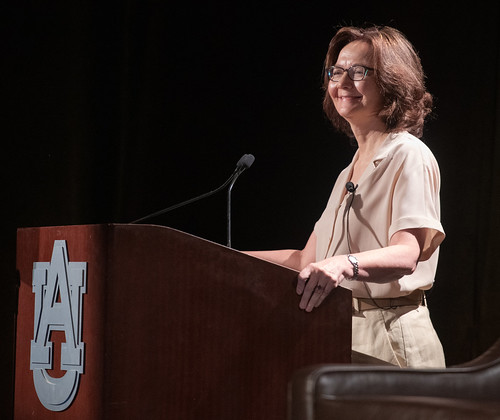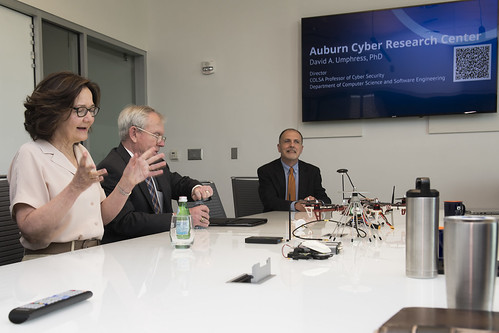CIA director praises sacrifice of Auburn alum, talks recruitment and opioid fight
Article body
Central Intelligence Agency Director Gina Haspel today praised the efforts and sacrifices of CIA officers, such as the late Auburn University alum Johnny Micheal “Mike” Spann, and discussed how the CIA needs new recruits to help keep the nation safe, especially in the fight against opioids.
Haspel, a 34-year CIA veteran nearing her first anniversary as director, made the comments during a National Security Forum at Auburn.
Spann was the first American to die in the line of duty in Afghanistan during the nation’s response to the terrorist attacks of September 11, 2001. The 1992 graduate lost his life Nov. 25, 2001, during an uprising of Taliban prisoners.
“Immediately before he was attacked and killed in the uprising, Mike was able to warn an agency colleague of the imminent danger, allowing that officer to get to safety,” said Haspel. “He demonstrated the highest standards of duty and sacrifice at the forefront of our fight against terrorism. In his short time in Afghanistan, Mike’s actions played a pivotal role in our battle against the Taliban and al-Qa‘ida in the region. His story is a poignant reminder of the unwavering commitment of all our men and women serving on the front lines.”
Haspel said today’s CIA officers are carrying on that commitment and noted the agency is seeking new recruits with educational training in foreign languages and from diverse backgrounds.
“We’re placing a renewed emphasis on foreign language expertise and training,” she said. “We want our men and women to be closely attuned to the cultures in which they operate and to speak the local language.
“And that aligns well with our push to strengthen diversity and inclusion at CIA. Our mission demands that we draw deeply from our nation’s rich and diverse talent pool. We just had our best recruiting year in a decade, and we’ll do whatever it takes to make the agency an employer of choice for all Americans.”
Haspel said one of the CIA’s top fights is currently the opioid crisis facing America.
“No foreign challenge has had a more direct and devastating impact on American families and communities than the flow of opioids and other drugs into our country—a scourge that has killed more Americans than any terrorist group ever has,” she said.
“That’s why we’re taking concrete steps to increase our contribution to the president’s whole-of-government approach in tackling this epidemic. I recently had the opportunity to meet with some of our officers who are on the front lines of this effort, and I’m proud of the work they’re doing to stop the problem closer to the source.”
At Auburn, Haspel addressed a crowd of approximately 300 attendees during her 20-minute talk followed by a question-and-answer session moderated by retired Lt. Gen. Ronald L. Burgess, Auburn University’s chief operating officer. Haspel then visited with students on campus and attended a cyber security briefing with faculty in the university’s Lt. Gen. Ronald Lee Burgess Cyber Laboratory.
“She is described by friends and peers of ours in the intelligence community as a quiet professional. She cares deeply about her people. She’s thoughtful. She’s resolute. And I can’t tell you how much in her position in Washington, D.C., that last word really means in terms of the position she holds,” Burgess said. “She really is a true intelligence professional and represents the intelligence community with distinction.”
Haspel concluded her remarks by speaking of Auburn’s role in national security.
“We at CIA could not be more grateful for your school’s distinguished history of service to our nation,” Haspel said. “And as you carry on that great tradition, I hope to see many of you again—as partners in the honorable and essential work of keeping America safe and free.”
Related Media
Media interested in this story can contact Communications Director Preston Sparks at (334) 844-9999 or preston.sparks@auburn.edu.
Auburn University is a nationally ranked land grant institution recognized for its commitment to world-class scholarship, interdisciplinary research with an elite, top-tier Carnegie R1 classification, life-changing outreach with Carnegie’s Community Engagement designation and an undergraduate education experience second to none. Auburn is home to more than 30,000 students, and its faculty and research partners collaborate to develop and deliver meaningful scholarship, science and technology-based advancements that meet pressing regional, national and global needs. Auburn’s commitment to active student engagement, professional success and public/private partnership drives a growing reputation for outreach and extension that delivers broad economic, health and societal impact.







